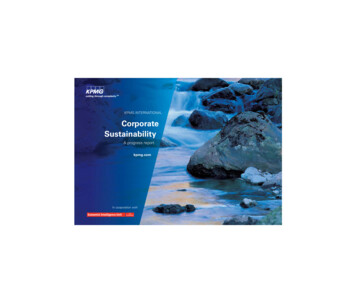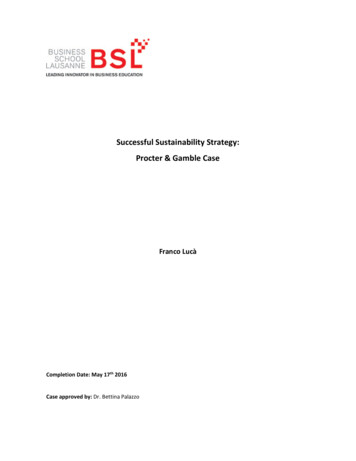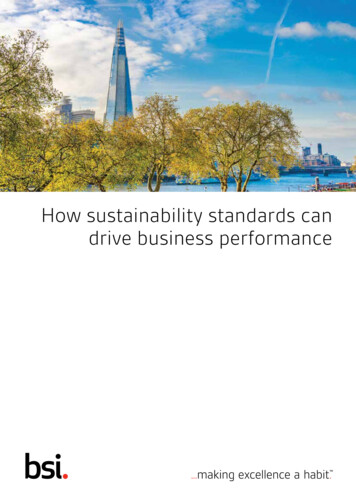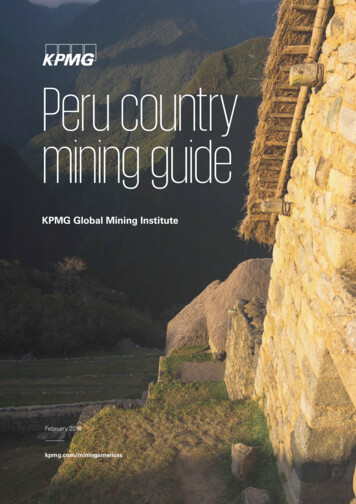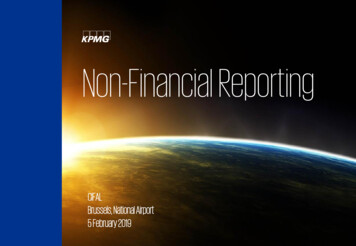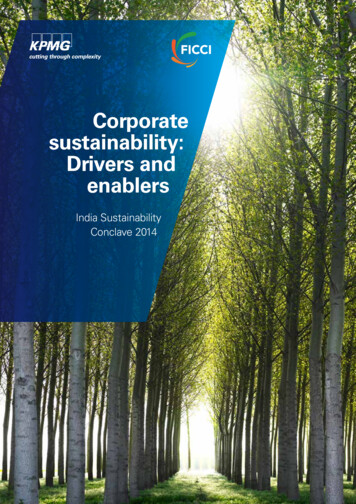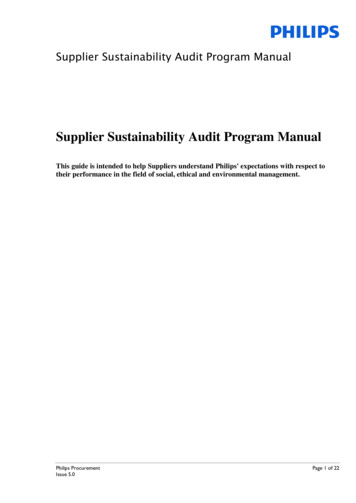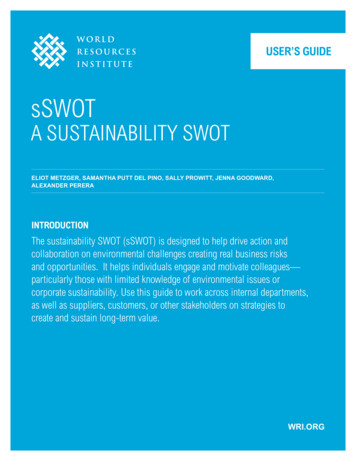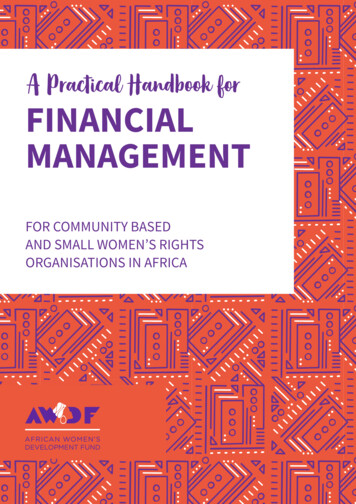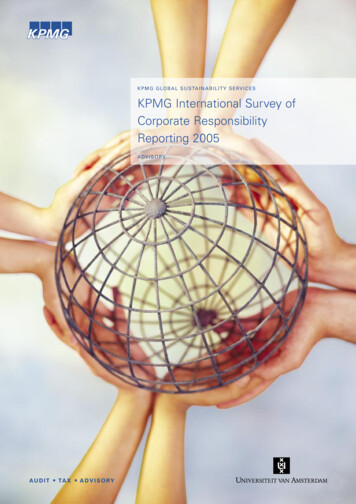
Transcription
K P M G G LO B A L S U STA I N A B I L I T Y S E RV I C E SKPMG International Survey ofCorporate ResponsibilityReporting 2005A DV I S O RY
KPMG International Surveyof Corporate ResponsibilityReporting 2005Research conducted byUniversity of Amsterdam and KPMGGlobal Sustainability ServicesTMAmsterdam graduateBusiness SchoolUniversity of AmsterdamRoeterstraat 111018 WB AmsterdamThe NetherlandsProf. Dr. Ans Kolk, Mark van der Veen,Jonatan Pinkse and Fabienne FortanierContact: Mark van der VeenTel. 31 (20) 525 4285Fax 31 (20) 525 5092Internet: http://www.wimm.nlKPMG's Global SustainabilityServicesTM offices(contact information in the back)Australia, Belgium, Canada, Denmark,Finland, France, Germany, Italy, Japan,The Netherlands, Norway, South Africa,Spain, Sweden, UK and USAKPMG Global SustainabilityServicesTMPO Box 745001070 DB AmsterdamThe NetherlandsTel. 31 (20) 656 4500Fax 31 (20) 656 4510e-mail: sustainability@kpmg.nlInternet: http://www.kpmg.comCo-ordination and final editing byShari Peters and Charlotte Extercatte,KPMG Global Sustainability ServicesTMSpecial contributions bySophie Punte, UNEP, Regional Officefor Asia and the Pacific, ThailandDenis Baletinskikh, Perm TechnicalUniversity, Perm, RussiaCopyright KPMG InternationalAll rights reserved. No part of thisreport may be reproduces or publishedin any form without written permissionfrom the publisher.ISBN 90-5522-031-0Layout and graphic design by In1 bv, RotterdamPrinted by Drukkerij Reijnen Offset, Amstelveen 2005 KPMG International. KPMG International is a Swiss cooperative of which all KPMG firms are members. KPMG International providesno services to clients. Each member firm is a separate and independent legal entity and each describes itself as such. All rights reserved.
KPMG International Survey ofCorporate ResponsibilityReporting 2005June 2005 2005 KPMG International. KPMG International is a Swiss cooperative of which all KPMG firms are members. KPMG International providesno services to clients. Each member firm is a separate and independent legal entity and each describes itself as such. All rights reserved.
2005 KPMG International. KPMG International is a Swiss cooperative of which all KPMG firms are members. KPMG International providesno services to clients. Each member firm is a separate and independent legal entity and each describes itself as such. All rights reserved.
ContentsForewords2Executive summary41 Introduction to the 2005 survey61.1 Background1.2 Survey methodology1.3 Contents of the report2 Trends in corporate responsibility reporting2.12.22.32.49OverviewType of CR reportsCR reporting by countryCR reporting by sectorEmerging CR reporting3 CR reporting: drivers and issues173.1 Drivers for corporate responsibility3.1.1 Business drivers3.1.2 Governance3.2 Issues in CR reporting3.2.1 Materiality3.2.2 Stakeholder engagementIssues and topics in CR reportsIndustry focus304 Assurance4.14.24.34.44.5OverviewCountry resultsSector resultsChoice of assurance providerDevelopments in assurance4.5.1 Assurance standards4.5.2 The assurance process5 AppendicesABCDEFComparison of the surveys, 1993, 1996, 1999, 2002 and 2005Fortune sectors and clustersMandatory reportingStandards, codes and guidelinesAssurance standardsGlossary 2005 KPMG International. KPMG International is a Swiss cooperative of which all KPMG firms are members. KPMG International providesno services to clients. Each member firm is a separate and independent legal entity and each describes itself as such. All rights reserved.37
2 KPMG International Survey of Corporate Responsibility Reporting 2005ForewordsKPMG InternationalI am delighted to present KPMG's fifth International Survey of corporateresponsibility reporting since 1993. The survey reflects the growing importancewithin the business community of corporate responsibility as the key indicator ofnon-financial performance, as well as a driver of financial performance. It alsoreflects the responsibility that business has to be transparent and accountablenot just to shareholders but also to the wider community.I have always believed that there is astrong moral and business case forcorporate responsibility. The moral casespeaks for itself: it is simply aboutdoing the right thing. The businesscase is that businesses perform bestwhen they play a strong role in thecommunities in which they operate,for example, by encouraging theiremployees to do voluntary work. AsInternational Chairman of KPMG and ofBusiness in the Community in the UK,my strong conviction is that the bestbusinesses of the 21st century will bethose that are both profitable andresponsible.These are important given recentcorporate scandals since companiesshould not just talk about responsiblepractice but be seen to be actingresponsibly. This can only happen ifthere is active communication withstakeholders and transparent reporting.I am pleased to provide you with thissurvey. I hope it will give you an insightinto the current developments incorporate responsibility reporting andstimulate your own ideas.As our survey underlines, the importantbusiness drivers for corporateresponsibility for companies are: to have a good brand and reputation to be an employer of choice to have and maintain a strong marketposition to have the trust of the financialmarkets and increase shareholdervalue to be innovative in developing newproducts and services and creatingnew markets.Chairman, KPMG InternationalMike Rake 2005 KPMG International. KPMG International is a Swiss cooperative of which all KPMG firms are members. KPMG International providesno services to clients. Each member firm is a separate and independent legal entity and each describes itself as such. All rights reserved.
KPMG International Survey of Corporate Responsibility Reporting 2005 3KPMG Global Sustainability ServicesTMWhen we published our first global survey in 1993, we did not expect that in lessthan a decade the number of top companies in industrialized countries producingthese kinds of reports would almost triple. Neither did we expect that corporateenvironmental reporting would be the 'icebreaker' for a much wider form ofcorporate responsibility (CR) reporting in the form of sustainability, triple bottomline or corporate social responsibility (CSR) reports. Reporting aimed atcommunicating with stakeholders, not only on environmental performance, butalso in an integrated manner on environmental, social and economic performance,to be transparent and accountable. We could not envisage that in countries and inindustry sectors lagging behind during the past few years, a tremendous effortwould be made to catch up with these developments, sometimes evenovertaking the vanguard. Looking back now to the beginning of the nineties,these facts are both striking and exciting.Corporate responsibility reporting inindustrialized countries has clearlyentered the mainstream. We haveobserved an increasing professionalismin the form of new global reportingstandards, standards that can be usedto provide assurance on corporateresponsibility reports. We also see thatcorporate responsibility performance ofcompanies has definitely caught theeye of the financial sector as isreflected in recent developments likethe Equator Principles, the Dow JonesSustainability Index (DJSI) and theFTSE4Good Index on the stockmarkets, and the emergence ofSocially Responsible Investment funds.The awareness of the financialimplications of climate change issueson businesses is also growing amongthe financial sector after theintroduction of the European UnionEmissions Trading Scheme (EU ETS)and the ratification of the KyotoProtocol.What are the business drivers behindcorporate responsibility? In theircorporate responsibility reports almost75 percent of companies state thatthese are economic reasons, whileover 50 percent give ethical reasonsand talk about integrity and values. Webelieve that corporations are still busyfinding their way in managingcorporate responsibility, which mightmean something different for eachcompany. Many of them are still in thestart-up phase.During our research conducted by theUniversity of Amsterdam and theprofessionals of KPMG's GlobalSustainability Services TM practice wewere excited by the new trends wefound and the overwhelming amountof information. We have focused onsome major trends in this report togive you better insight into the globaldevelopments in CR reporting. If youwould like to know more or havespecific questions, we will be pleasedto assist you. 2005 KPMG International. KPMG International is a Swiss cooperative of which all KPMG firms are members. KPMG International providesno services to clients. Each member firm is a separate and independent legal entity and each describes itself as such. All rights reserved.We are aware that there are differentapproaches to corporate responsibilityin different regions and they might allhave an influence on each other. Thiswas not the subject of our survey, butsome of these differences might bereflected in the results.Corporate responsibility is easier saidthan done. The real challenge is in theintegration of corporate responsibilityinto strategy and operations of acomplex organization in a more andmore globalizing economy. It is anunfolding learning journey. Thedestination cannot be predicted andthe outcomes cannot be controlled.This is where we as KPMG memberfirms can play a role. Our professionalsin corporate responsibility in more than33 countries globally, with theirexperience in working for multinationalcorporations will be pleased to offeryou support on your company's ownlearning curve and help you to makethe change from a business perspective.Do not hesitate to contact us.George MolenkampChairman, KPMG Global SustainabilityServicesTM
4 KPMG International Survey of Corporate Responsibility Reporting 2005Executive summaryThe KPMG International Survey of Corporate Responsibility Reporting 2005 hasbeen the most comprehensive survey of its kind since its initiation in 1993. Thistriennial survey analyzes trends in CR reporting of the world's largestcorporations, including the top 250 companies of the Fortune 500 (Global 250,G250) and top 100 companies in 16 countries (National 100, N100). With its vastcoverage of 1600 companies the survey provides a truly global picture ofreporting trends over the last ten years.Major survey findings: CR reporting has been steadily risingsince 1993 and it has increasedsubstantially in the past three years.In 2005, 52 percent of G250 and 33percent of N100 companies issuedseparate CR reports, compared with45 percent and 23 percent,respectively, in 2002. If we includeannual financial reports with CRinformation, these percentages areeven higher: 64 percent (G250) and41 percent (N100). A dramatic change has been in thetype of CR reporting which haschanged from purely environmentalreporting up until 1999 tosustainability (social, environmentaland economic) reporting which hasnow become mainstream amongG250 companies (68 percent) andfast becoming so among N100companies (48 percent). Although the majority of N100companies (80 percent) in mostcountries still issue separate CRreports, there has been an increasein the number of companiespublishing CR information as part oftheir annual reports. 2005 KPMG International. KPMG International is a Swiss cooperative of which all KPMG firms are members. KPMG International providesno services to clients. Each member firm is a separate and independent legal entity and each describes itself as such. All rights reserved. At national level, the top twocountries in terms of separate CRreporting are Japan (80 percent) andthe UK (71 percent). Reporting hasincreased considerably over the lastthree years in most of the 16countries in the survey, with thehighest increases seen in Italy,Spain, Canada and France. The typical industrial sectors withrelatively high environmental impactcontinue to lead in reporting. At theglobal level (G250), more than 80percent companies are reporting inelectronics & computers, utilities,automotive and oil & gas sectors,whereas at the national level (N100),over 50 percent of companies arereporting in the utilities, mining,chemicals & synthetics, oil & gas,oil & gas and forestry, paper & pulpsectors. Most remarkable is thefinancial sector which shows morethan a two-fold increase in reportingsince 2002.
KPMG International Survey of Corporate Responsibility Reporting 2005 5The survey includes a detailed analysisof the reports from the G250companies which is focused on whycompanies are committed to corporateresponsibility and what influences thecontent of reports. These results aresummarized below: Business drivers for CR are diverse,both economic (74 percent) andethical (53 percent). The top 3reported economic drivers areinnovation & learning, employeemotivation and risk management& reduction with about 50 percentcompanies reporting these asmotivating factors. Almost two-thirds of CR reportsinclude a section on corporategovernance, although most reportslack specifics on how CR isstructured and information on howgovernance policies are implementedwithin the organization. The survey analyzed how companiesselect the issues discussed in thereports and whether the users of thereport are systematically consultedduring the process. The surveyrevealed that report content is most1commonly decided based on GRIguidelines (40 percent) with only afifth (21 percent) mentioningstakeholder consultation. About athird of the companies (32 percent)invite stakeholder feedback on thereport. Stakeholder dialogue was mentionedin almost 40 percent of reports withdialogue focused more on CRpolicies rather than reporting.Compared with environmental issues,coverage of social and economicissues and topics is far moresuperficial. Social topics are discussed by almosttwo-thirds of the companies,generally, in one or more of fourareas: core labor standards, workingconditions, community involvementand philanthropy. While the majorityof companies express theircommitment to these issues,reporting performance remainssketchy, possibly due to the lack ofclear social indicators. Economic issues are discussed bythe minority of companies. Although61 percent of reports includefinancial information such as profits,only 25 percent discuss theeconomic impacts of their businessfrom a broader, sustainabilityperspective. Reporting on the supply chain is nowcommon. Supplier issues are mentioned in a vast majority (80 percent)of reports, albeit without specifics,as companies are increasingly beingasked to extend their responsibilitydown the supply chain. The survey analyzed reports for oneof the most pressing environmentalissues of today, climate change,which was addressed in about 85percent of reports.Independent assurance1 remains avaluable part of reporting. In 2005 thenumber of reports with an assurancestatement increased to 30 percent(G250) and 33 percent (N100) from 29percent and 27 percent, respectively,in 2002. Major accountancy firmscontinue to dominate the CRassurance market with close to 60percent of the statements.Assurance, as used here, refers to services other than audit as defined by the International Auditing & Assurance Standards Board. 2005 KPMG International. KPMG International is a Swiss cooperative of which all KPMG firms are members. KPMG International providesno services to clients. Each member firm is a separate and independent legal entity and each describes itself as such. All rights reserved.
6 KPMG International Survey of Corporate Responsibility Reporting 20051 Introduction to the 2005 surveyDefining corporate responsibilityThe terminology used in relation tocorporate responsibility and forreporting on CR performance isvaried. Companies may refer tosustainability, sustainabledevelopment, corporate socialresponsibility and corporateresponsibility, to name a few4. Allof these terms broadly cover thetopics of social, environmental andeconomic performance withdiffering levels of detail. For thepurpose of the survey, we refer toall such activities and relatedreports by the general termCorporate Responsibility.Corporate responsibility:The commitment of business tocontribute to sustainable economicdevelopment, working withemployees, their families, the localcommunity and society at large toimprove their quality of life.234The KPMG International Survey of Corporate Responsibility Reporting 2005 is thefifth in the series of KPMG surveys initiated in 1993 and published every threeyears since then. Conducted jointly by KPMG International's Global SustainabilityServicesTM (GSS) and the University of Amsterdam, the survey analyzes morethan 1,600 of the world's biggest companies, by selecting the top 250 from theGlobal Fortune 500 (Global 250, G250) and the top 100 companies in 16industrialized nations (National 100, N100) where reporting on corporateresponsibility (CR) is already an established practice. An additional feature of thissurvey is the commentary on emerging trends in CR reporting in four regions.As in our last two surveys, the 2005survey explores trends in CR reporting,both regionally and by sector. It alsoinvestigates the drivers for corporateresponsibility; discusses issues relatedto CR reporting, and provides someinsight into the contents of the reports.The G250 group of companies isindicative of the large multinationalcorporations that often tend to beleaders or pioneers in CR performance2.On the other hand, the N100 group ofcompanies gives a broad view ofworldwide developments at nationallevel. Together this parallel researchprovides a comprehensive view of theglobal trends in CR reporting.- World business Council forSustainable Development1.1 Background(WBCSD), 2004Seen from a purely ethical orphilanthropic viewpoint, CR is notwithout its critics who claim that it isyet another promotional campaign toimprove corporate image and publicrelations. Others believe that costly CRactivities are detrimental to the classicshareholder value theory. However, agrowing number of companies (andtheir stakeholders) believe that longterm business success depends notonly on a healthy balance sheet, butalso on social and environmentalperformance. Analysis of the widertangible and intangible impacts oncommercial performance, along withgreater focus on risk and opportunities,is steadily establishing the businesscase for CR. Companies will build(long-term) shareholder value byengaging with stakeholders other thanthe legal owners of the company andby taking into account the impact ofbusiness on the society (andenvironment)3. This puts CR firmly onthe agenda of corporate boards andaudit committees.“Towards transparency: progress on global sustainability reporting”, The Association of Chartered Certified Accountants (ACCA), 2004“CSR: is there a business case?”, ACCA, 2003“Corporate Social Responsibility: What's in a Name?”, World Business Council for Sustainable Development (WBCSD), 2004 2005 KPMG International. KPMG International is a Swiss cooperative of which all KPMG firms are members. KPMG International providesno services to clients. Each member firm is a separate and independent legal entity and each describes itself as such. All rights reserved.
KPMG International Survey of Corporate Responsibility Reporting 2005 7“The findings of this authoritativeKPMG survey on the worldwidepractice of sustainability reportingsends GRI a significant message –the increase in use of the GRIGuidelines since 2002 as thesingle, global, framework forsustainability reporting highlightsthe need for a more robustplatform to support growth innumbers of reporters, andincreases in high-quality, relevant,performance-focused, andcomparable reporting. This will bean ongoing reminder about GRI’sconstant responsibility to itsstakeholders to continuouslyimprove the SustainabilityReporting Guidelines based onuser’s experiences and needs.”- Ernst Ligteringen, CEO, GRIIn the 1990s, non-financial reportingwas dominated by environmentalconcerns. The trend toward sustainablebusiness practice, against a backdropof recent corporate governancescandals, has increased companyawareness of the need to beaccountable to a wider audience for allaspects of performance. Systematicpublic reporting on environmental andsocial (and ethical issues), togetherwith economic performance, is animportant way for companies tocommunicate their corporateresponsibility to their stakeholders,thereby improving transparency andpublic trust.In addition to the rising strategicimportance of CR at board level,increasing standardization and newregulations, not least in the field ofcorporate governance, is alsoinfluencing CR reporting. The 2005survey therefore addresses theseissues in more detail, including aspecial section on the motivation forCR reporting, based on an analysis ofinformation in the G250 reports.In terms of CR reporting guidelines theSustainability Reporting Guidelines ofthe Global Reporting Initiative (GRI)5,developed through a multi-stakeholderprocess, are now well established.Currently, 660 companies spreadthroughout 50 countries report6 on thebasis of GRI guidelines. The guidelinesprovide principles and detailedindicators for reporting on all aspects5of CR performance. Furtherrefinement, such as the ongoingdevelopment of sector-specificguidelines and protocols, for exampleon reporting boundaries, should helpcompanies to focus their reporting andimprove possibilities for benchmarkingperformance.The need for consistency andtransparency in relation to externalassurance7 on CR reporting is alsoreceiving considerable attention. Sincethe last survey, a number of standardshave also been introduced in this field(Appendix E). Globally, the accountancyprofession has introduced a standardfor assurance on non-financialinformation, the International Standardfor Assurance Engagements (ISAE)3000, while AccountAbility hasreleased AA1000 Assurance Standard,AA1000AS.Finally, dialogue continues on thesignificance of CR information to thefinancial community. As aconsequence, companies areincreasingly being asked to report onCR and governance information in asystematic and standardized mannerby identifying and prioritizing keychallenges, and to report this, whererelevant, as part of the annual(financial) report. The financialcommunity invites regulators toprovide a framework for disclosure andaccountability in these areas to supportinvestment ing.orgAssurance, as used here, refers to services other than audit as defined by the International Auditing & Assurance Standards Board.8“Who Cares Wins: Connecting Financial Markets to a changing World”, The Global Compact, 200467 2005 KPMG International. KPMG International is a Swiss cooperative of which all KPMG firms are members. KPMG International providesno services to clients. Each member firm is a separate and independent legal entity and each describes itself as such. All rights reserved.
8 KPMG International Survey of Corporate Responsibility Reporting 20051.2 Survey MethodologyThe survey involved a parallel analysisof the CR reporting of two groups ofcompanies. The first set consisted ofthe top 250 companies of the GlobalFortune 500 (G250) and was analyzedby the University of Amsterdam. Thesecond set, consisting of the top 100companies (N100) in 16 countries –Australia, Belgium, Canada, Denmark,Finland, France, Germany, Italy, Japan,Netherlands, Norway, South Africa,Spain, Sweden, UK and the USA –were analyzed by the KPMG practicesin those countries. The N100 list wascreated by revenue ranking based on arecognized national source.The reports, either separate CR orpublished as part of corporate annualreports, were gathered betweenSeptember 2004 and January 2005.These were the most recent corporatereports published in the previous twoyears, with the majority covering thecalendar year 2003 or financial year2003/4. The survey included only thosereports that fit the definition of CRreports. Brochures, promotionalmaterials and other available information, including websites andcommunications strictly devoted tocommunity involvement, wereexcluded from the research. Similarly,information from websites, other thanCR reports in HTML format, was alsoexcluded from the analysis.The majority of the reports weredownloaded from corporate websites.If the report was not available online,the companies were approachedindividually. This resulted in a responserate of 98 percent. The remaining 2percent was assumed not to have areport. Reports from both groups(G250 and N100) in the survey wereanalyzed by country, sector as well aslevel and type of assurance. Inaddition, a more detailed analysis ofthe content of the G250 reports wasundertaken. The analyses wereconducted systematically using astandard questionnaire to maximizeconsistency and objectivity. Thecommentary on four regions whereCR reporting is emerging was basedon desk research by field practitioners.1.3 Contents of the reportThe results of the trend analysis,with regard to number of reports andsectors, at both global (G250) andnational (N100) levels, are presented inSection 2. This section also gives anoverview of emerging, regional CRreporting activities, in particular in fourregions: Asia, Latin America, Africa andRussia (Emerging CR reporting).Section 3 presents the reported 2005 KPMG International. KPMG International is a Swiss cooperative of which all KPMG firms are members. KPMG International providesno services to clients. Each member firm is a separate and independent legal entity and each describes itself as such. All rights reserved.business-related motivation of theG250 companies for reporting on CRand the factors that influence thescope of the reports, namelymateriality, use of standards, andstakeholder engagement. Section 4provides information regarding specifictopics discussed in the CR reports(Issues and topics in CR reports) andinformation regarding CR issues incertain industry sectors (Industryfocus). Section 5 presents an overviewof survey trends and fielddevelopments related to externalassurance. The survey report alsoincludes interesting case studies andcommentary from industry andthought leaders.In Appendix A, the 2005 survey iscompared with previous years'surveys. Appendix B provides anoverview of the G250 sectors.A summary of mandatory reportingrequirements is included in AppendixC, while Appendix D lists the standardsand guidelines available for reportingboth internationally and by country.Appendix E provides information onstandards relating to externalassurance on CR reports atinternational and national level.Appendex F provides a glossary ofabbreviations and terminologies usedin this report.
KPMG International Survey of Corporate Responsibility Reporting 2005 92 Trends in corporate responsibility reportingThe 2005 survey shows that the sheer number of organizations, both at globaland national levels, reporting on CR information has risen significantly since the2002 survey. There is also an overall increase in the scope of issues discussed,showing a trend of moving from purely environmental reporting tocomprehensive reporting on the wider aspects of corporate responsibility.separate report or as part of the annualreport, and 33 percent (525 companies)published a separate report, comparedwith 23 percent10 in 2002.2.2 Type of CR reports2.1 Overview(129 companies) published a separatereport, compared with 45 percent9(112 companies) in 2002. Seen at anational level, 41 percent (658companies) of the N100 corporationspublished CR information, either as aAs shown in Figure 1, 64 percent (161companies) of the G250 corporationspublished CR information, either as aseparate report or as part of the annualfinancial report, and 52 percent52%64%G25045%33%41%N10023%The most remarkable change since2002 has been in the type of reportscompanies are issuing as separate(stand-alone) CR reports. In 2005,almost 70 percent of the global G250and almost 50 percent of the N100reports are published as sustainability(social, environmental and economic)reports. In 2002, however, almost 70percent of both global and nationalreports were environmental, health andsafety (EHS) reports. Stand-alone EHSreporting has dropped to about 20percent.%010203040506070Percentage companies with CR reports (separate only), 2005Percentage companies with CR reports (separate only), 2002Percentage companies with CR reports (separate and published as part of annual report), 2005G250 - Global Fortune 250 companiesN100 - Top 100 companies in 16 countries%Figure 1: Corporate responsibility (CR) reporting,Global 250 and Top 100 in 16 countries (2002, aland SocialEnvironmentalHealth and SafetySocialSustainability20052002Figure 2a: Type of corporate responsibility (CR) reports, Global 250 (2002, 2005)Figure 2b: Type of corporate responsibility (CR) reports, Top 100 in 16 countries (2002, 2005)91012%11%The 2002 survey did not segregate information regarding reports that publish CR information in annual reportsDue to change in survey methodology this number has slightly changed from one reported in 2002 2005 KPMG International. KPMG International is a Swiss cooperative of which all KPMG firms are members. KPMG International providesno services to clients. Each member firm is a separate and independent legal entity and each describes itself as such. All rights reserved.Environmentaland SocialEnvironmentalHealth and SafetySocial
10 KPMG International Survey of Corporate Responsibility Reporting 20052.3 CR reporting by country80%Japan72%Reporting trend by country for N100companiesFigure 3 presents the data on thenumber of CR reports published asseparate reports and those publishedas part of annual reports for 2005.Because of the change in the nature ofreporting, the trend at national level isonly analyzed for separate CR repor
corporate responsibility reporting and stimulate your own ideas. Mike Rake Chairman, KPMG International KPMG International I am delighted to present KPMG's fifth International Survey of corporate responsibility reporting since 1993. The survey reflects the growing importance within the busi
